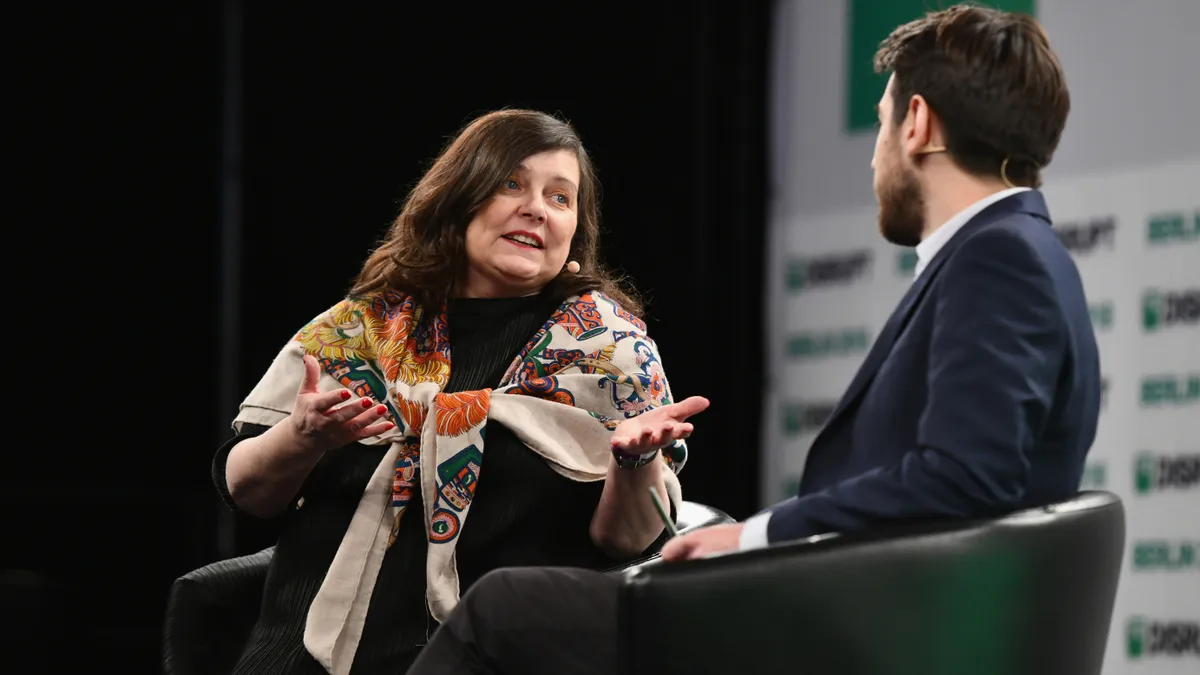Dive Brief:
- JPMorgan Chase and Lloyds have expressed interest in buying the British challenger bank Starling, The Times of London reported Saturday.
- The potential development follows months of speculation surrounding JPMorgan’s desire to launch a digital bank in the U.K. Sources told Sky News in February the U.S.’s largest bank was in talks with British regulators to roll out a range of savings and loan products in the U.K. using the Chase brand. The news channel reported in August the bank was hoping to launch its U.K. digital efforts in the first quarter of 2021.
- However, a deal — regardless of the suitor — would stand in contrast to the vision Starling CEO Anne Boden saw for her company as recently as May. "I didn't start a bank to sell out to the big boys," she said at that time.
Dive Insight:
Buying an established bank could alleviate some of the pressure JPMorgan may feel in growing a customer base in a new market from the ground up. Starling would give the bank more than 1.8 million users upon an acquisition. By comparison, it took Goldman Sachs nearly two years to amass 500,000 customers after launching its digital arm, Marcus, in the U.K. in 2018.
Lloyds, The Times reported, is interested in Starling’s technology. The digital bank opened a data room as part of a plan to raise £200 million in new funding. Any tie-up between a challenger and a traditional bank would be a first in Britain, the publication said.
Starling's customer base doubled during the first two months of the pandemic as sole traders opened new accounts hoping to benefit from the Bounce Back Loan Scheme (BBLS), a British government-backed coronavirus relief program, Boden told the AltFi Digital Summit this year.
The bank lent out £90 million ($110.1 million) within the first day and a half of accepting applications for the program, according to Business Insider.
Starling further expanded its reach by offering small-business loans, in partnership with Funding Circle, through the government’s Coronavirus Business Interruption Loan Scheme.
However, the pandemic stalled Starling’s progress toward obtaining a European banking license and delayed Boden’s long-held goal of an initial public offering.
"If you look at the numbers, we’re probably going to be roughly where we were planning to be, but six to nine months out," she said in May. "It’s probably still going to be an IPO for us eventually, but I think being realistic, it’s not going to be next year.”
A Starling spokeswoman reiterated that to The Times last week. "Anne has always said she will never sell to a big bank," she said. "An IPO is still in our sights."
Some of Starling’s biggest shareholders, however, may prefer to sell, the publication reported. The bank’s valuation is thought to stand at more than £1 billion. And it reportedly made a £800,000 profit in October.
JPMorgan’s U.K. effort wouldn’t be the bank’s first attempt at a digital-only platform. It launched the millennial-aimed Finn in 2018 but closed the app a year later, saying the Chase brand was better equipped for the job and that younger customers didn’t necessarily want a separate digital experience.
David Brear, CEO of U.K. digital banking consultancy 11:FS, said some analysts blamed Finn’s demise on JPMorgan’s failure to differentiate it from the bank’s other products.
"Time will tell how successful they are as they are entering into a very competitive marketplace in the U.K. with players like Monzo, Starling and Revolut already doing most of what this could be," Brear said in February. "Moving to the U.K., where they have no retail operations, allows JPMC to really rethink the things that matter most."
JPMorgan and Lloyds declined to comment to The Times.














